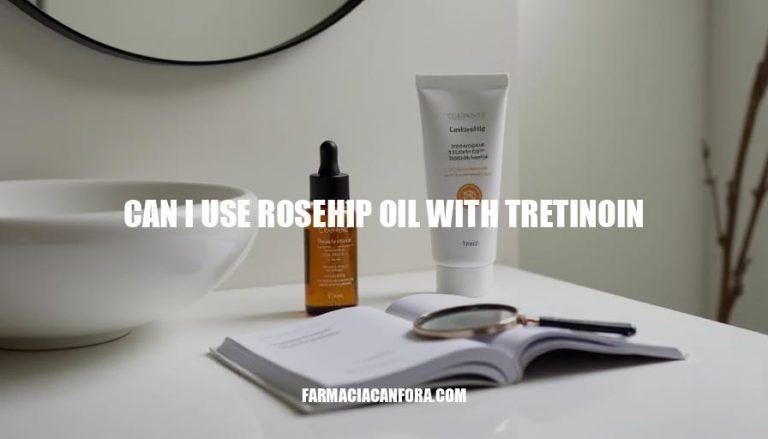


Rosehip oil and tretinoin are super effective in skincare routines. Tretinoin, a powerful vitamin A derivative, helps with cell turnover, acne, and fine lines. It also reduces discoloration.
Rosehip oil is rich in fatty acids and antioxidants like vitamins A and C. It hydrates the skin and supports regeneration and elasticity.
When combining these two ingredients, you need to be careful. Tretinoin can make your skin more sensitive, especially when paired with rosehip oil’s natural retinoids.
Understanding how they work together is key to getting good results without irritating your skin. A thoughtful approach ensures that both products work well together without harming your skin.
Rosehip oil and tretinoin can be used together in a skincare routine, but their compatibility requires careful consideration due to their active properties. Tretinoin, a potent retinoid, accelerates skin cell turnover and can cause dryness, irritation, and increased sensitivity to sunlight. Rosehip oil, rich in essential fatty acids, antioxidants, and natural vitamin A derivatives, offers hydration and skin barrier support.
However, rosehip oil contains trace amounts of tretinoin, which may amplify the effects of topical tretinoin if not used cautiously.
Hydration and Barrier Support: Rosehip oil is known for its ability to moisturize and repair the skin barrier, making it a suitable companion to counteract the dryness caused by tretinoin.
Potential Overlap in Retinoid Activity: The natural vitamin A derivatives in rosehip oil, including trace amounts of tretinoin, may increase the skin’s retinoid load. This necessitates careful monitoring to avoid irritation.
Sun Sensitivity: Both tretinoin and rosehip oil can heighten photosensitivity. Dermatologists recommend using these products only at night and applying sunscreen diligently during the day.
Preparation:
Cleanse your face with a gentle, non-exfoliating cleanser to remove impurities without stripping the skin.
Pat your skin dry with a soft towel.
Application Timing:
Apply tretinoin first, as it needs direct contact with the skin to be effective.
Use a pea-sized amount and spread it evenly over your face, avoiding sensitive areas like the eyes, corners of the mouth, and nostrils.
Wait for 20-30 minutes to allow tretinoin to fully absorb and minimize the risk of irritation.
Layering Techniques:
Follow with 2-3 drops of rosehip oil. Warm the oil between your palms and gently press it onto your skin. This helps seal in moisture and provides a soothing effect.
If your skin is particularly sensitive, consider applying a lightweight moisturizer before tretinoin to create a buffer, then layer rosehip oil as the final step.
Frequency:
Start by using tretinoin 2-3 times a week and gradually increase frequency as your skin builds tolerance.
Introduce rosehip oil on alternate nights initially, then use it nightly as your skin adjusts.
Precautions:
Avoid combining tretinoin and rosehip oil with other active ingredients like AHAs, BHAs, or vitamin C in the same routine to prevent irritation.
Perform a patch test with rosehip oil before incorporating it into your routine to rule out any allergic reactions.
Always use a broad-spectrum sunscreen with SPF 30 or higher during the day to protect your skin from UV damage.
This combination, when used correctly, can enhance skin hydration, reduce irritation, and support the benefits of tretinoin while minimizing its side effects.
1www.emedihealth.com2sasilyskin.com3eleganceshape.com
Using rosehip oil with tretinoin requires careful consideration due to their active properties.
Tretinoin, a potent retinoid, can cause dryness, irritation, and increased sensitivity to sunlight, while rosehip oil offers hydration and skin barrier support. However, the natural vitamin A derivatives in rosehip oil may amplify the effects of topical tretinoin if not used cautiously.
By following these guidelines and considering individual skin sensitivity, you can safely integrate both products into your skincare routine.